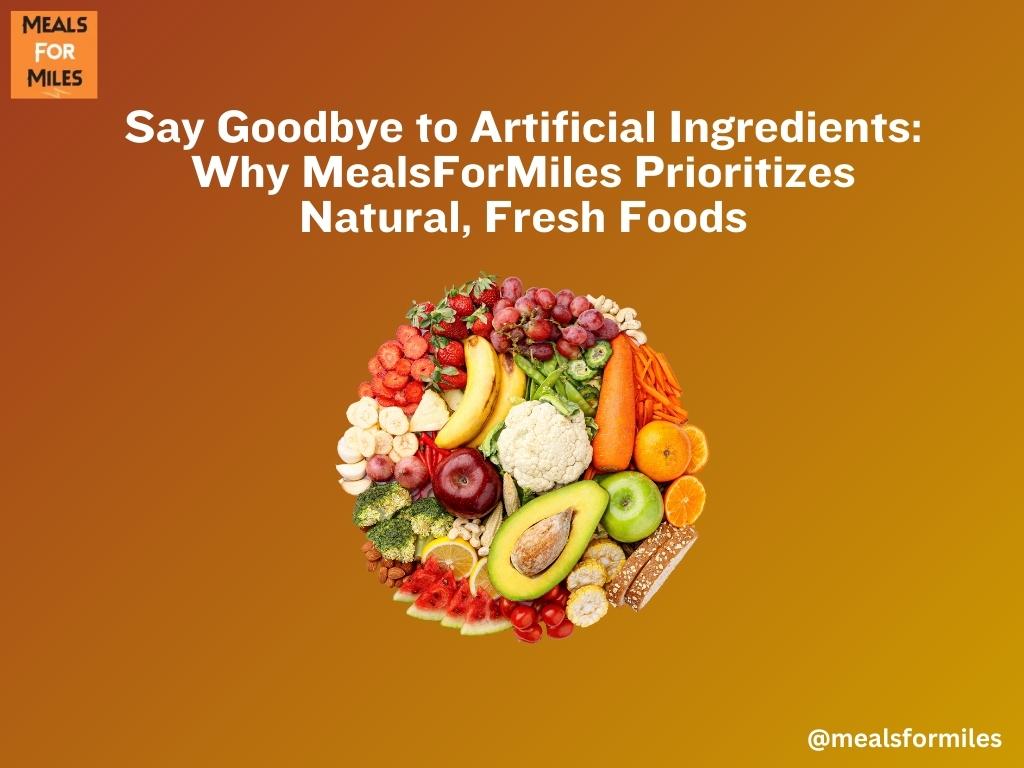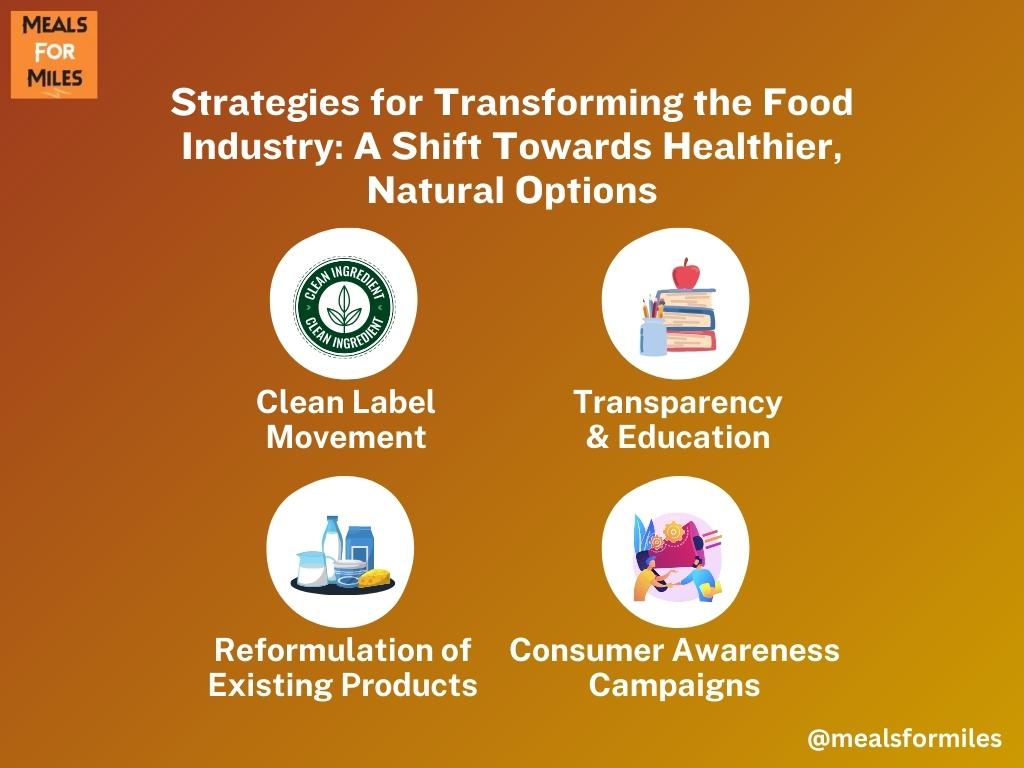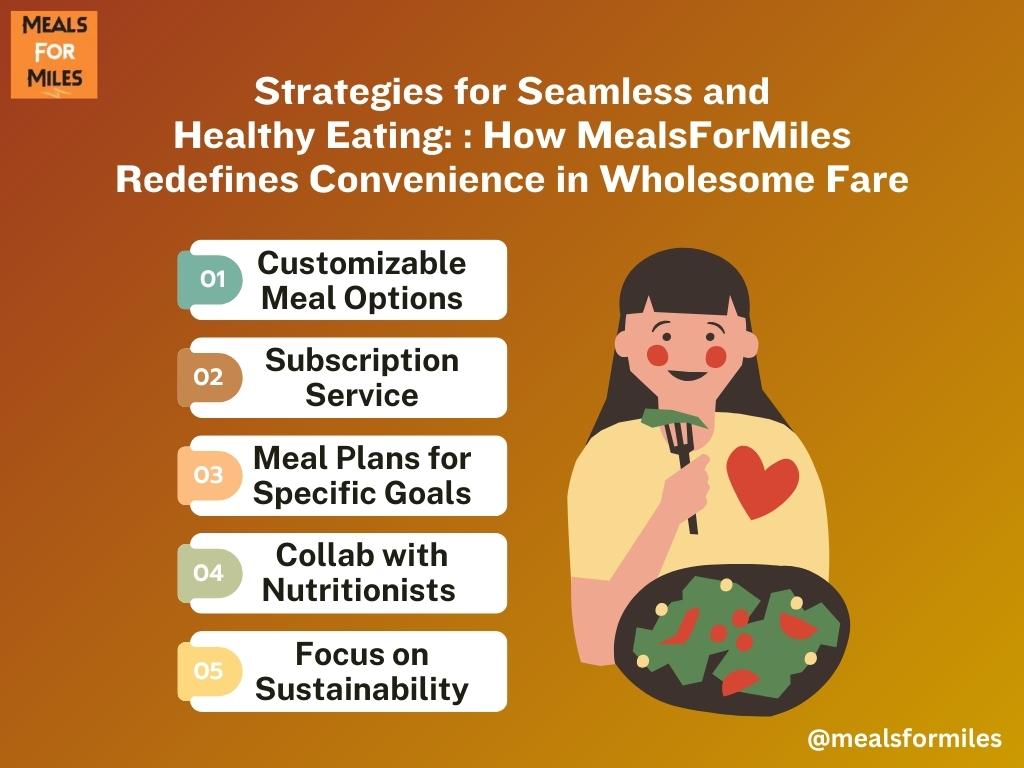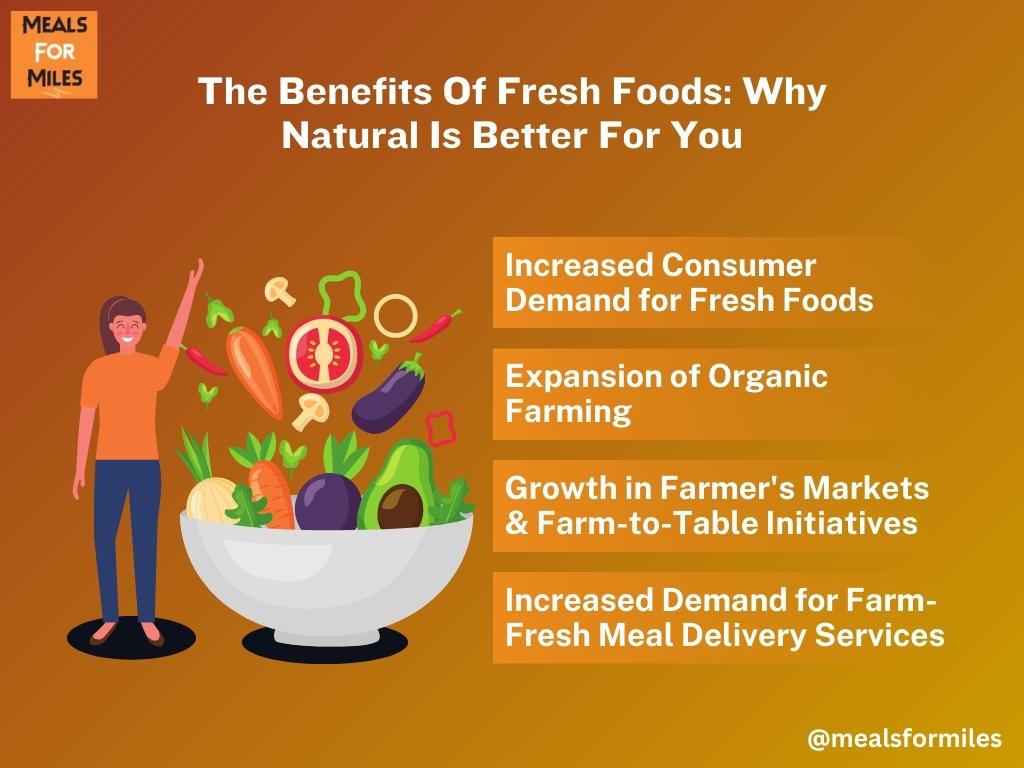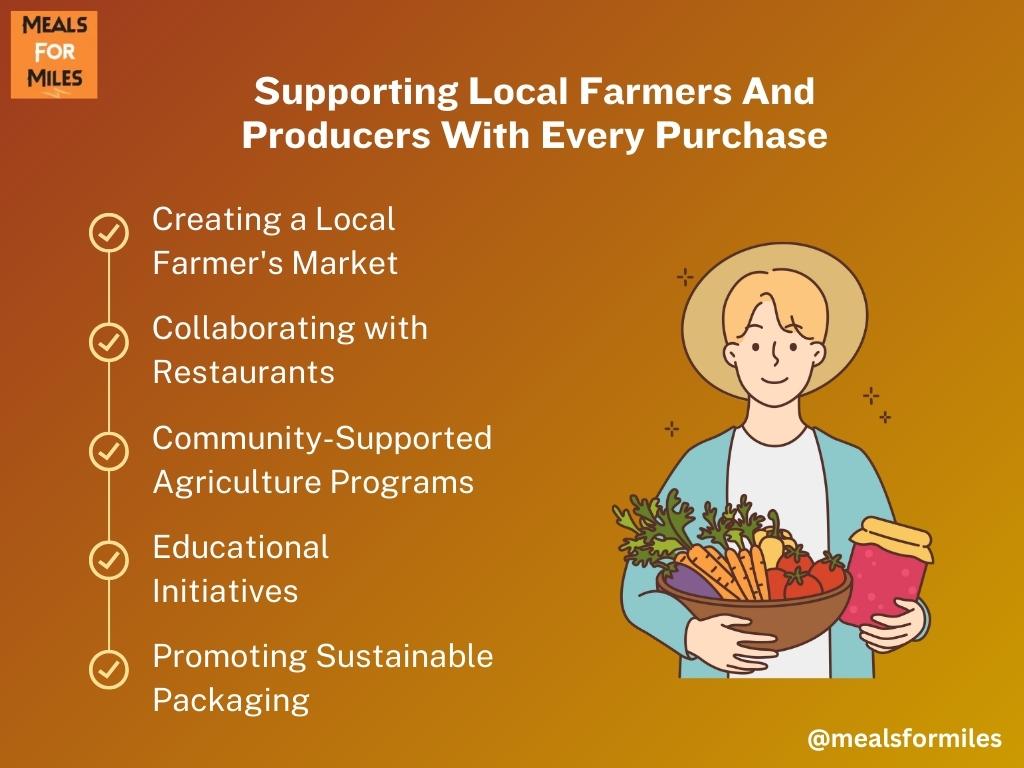Are you tired of compromising your health for convenience?
It’s time to make a change! At MealsForMiles, we’re on a mission to revolutionize the way you eat. Say goodbye to artificial ingredients and hello to the vibrant, delicious world of natural, fresh foods.
MealsForMiles is a company that is dedicated to providing natural, fresh meals made with high-quality ingredients. In a world where processed foods with artificial additives are becoming increasingly common, MealsForMiles aims to prioritize health and nutrition by offering meals that are as close to their source as possible. By using only natural ingredients and avoiding artificial additives, MealsForMiles ensures that each meal is nutritious and free from harmful substances.
The company understands the challenges of maintaining a healthy diet in a busy world, which is why they make it easy for individuals to access wholesome meals through online ordering and convenient pick-up options. By choosing natural, fresh foods, customers can enjoy the benefits of increased energy, improved digestion, and mental clarity. In addition, MealsForMiles supports local farmers and producers, contributing to the local economy and reducing the carbon footprint. By embracing a lifestyle that values real whole foods, customers can take control of their health and well-being, while also creating positive change for future generations.
Table of Contents
- Introduction to MealsForMiles: A Commitment to Natural, Fresh Foods
- The Rise of Artificial Ingredients: What We’ve Been Eating
- Say Goodbye To Artificial Ingredients: Why MealsForMiles Prioritizes Natural, Fresh Foods
- Making the Switch: How MealsForMiles Is Different
- What’s In Our Food? Recognizing Artificial Ingredients On Labels
- The Benefits Of Fresh Foods: Why Natural Is Better For You
- Reaping The Rewards Of Natural Nutrition: How Your Body Feels Differently With Each Meal
- Supporting Local Farmers And Producers With Every Purchase
- Taking Control Of Your Health Through Conscious Eating Habits
- Final Thoughts – Embracing A Lifestyle That Values Real Whole Foods
Introduction to MealsForMiles: A Commitment to Natural, Fresh Foods
MealsForMiles is a company that specializes in providing ready-to-eat meals made with natural, fresh ingredients. We are committed to providing meals that are as close to their source as possible. We believe that consuming real, whole foods is essential for optimal health and wellbeing. Our mission is to make it easier for people everywhere to access nutritious, delicious meals made with natural ingredients and no artificial additives or preservatives.
The Rise of Artificial Ingredients: What We’ve Been Eating
In recent years, the food industry has become increasingly dominated by processed foods laden with artificial ingredients and chemicals. From highly processed snacks and frozen dinners to “low-fat” options marketed as healthier alternatives – these products often contain unhealthy additives like high fructose corn syrup, hydrogenated oils, and synthetic colors or flavors. This type of food has become commonplace in our diets due to its convenience, but unfortunately, it comes at a cost – compromised health and nutrition.
Here are the 10 Strategies for Transforming the Food Industry: A Shift Towards Healthier, Natural Options:
- Health-Conscious Convenience Foods: As the demand for healthier options continues to rise, there is an opportunity for the food industry to develop convenient, ready-to-eat meals and snacks that are free from artificial ingredients and chemicals. Companies could focus on using natural sweeteners, healthier oils, and plant-based colors and flavors to cater to health-conscious consumers.
- Clean Label Movement: With increasing awareness about the negative effects of artificial ingredients, there is a growing movement towards “clean labels” – food products that have simple, recognizable ingredients. Reformulating products to meet this demand and capitalize on the clean label trend is a viable strategy.
- Functional Foods with Natural Ingredients: The rise of artificial ingredients has led to a disconnect between consumers’ desire for healthier options and the convenience of processed foods. Encouraging the development of functional foods that are both convenient and made with natural, beneficial ingredients can bridge this gap.
- Transparency and Education: As consumers become more concerned about what they are eating, there is a need for greater transparency and education in the food industry. Educating consumers about the potential health risks associated with artificial ingredients and chemicals is crucial for making informed choices.
- Reformulation of Existing Products: Many popular processed foods are laden with artificial ingredients, but consumer demand for healthier options is growing. Advising food manufacturers on reformulating their existing products to reduce or eliminate artificial ingredients without compromising taste or shelf life is essential.
- Collaboration with Nutritionists and Dietitians: To address the compromised health and nutrition caused by artificial ingredients, the food industry can collaborate with nutritionists and dietitians to develop guidelines for healthier food production. Organizing conferences, workshops, and seminars where professionals from both fields can exchange knowledge is a step toward improvement.
- Investing in Research and Development: The rise of artificial ingredients in processed foods has highlighted the need for innovation in food production. Advocating for increased investment in research and development to discover new ingredients, technologies, and processing methods that can create healthier alternatives is crucial.
- Government Regulations and Labeling: Working with policymakers and regulatory bodies to establish stricter regulations on the use of artificial ingredients and chemicals in processed foods is important. Advocating for clearer and more informative labeling practices that enable consumers to make well-informed decisions is a step in the right direction.
- Consumer Awareness Campaigns: Initiating and supporting consumer awareness campaigns to educate the public about the potential dangers of artificial ingredients in processed foods is beneficial. Highlighting the benefits of natural, whole foods and providing alternatives to processed options can help shift consumer preferences towards healthier choices.
- Reinventing the Snack Industry: Snacks are often associated with unhealthy ingredients, but developing innovative, nutrient-dense snack options that are free from artificial ingredients can meet the demand for convenient, on-the-go foods without compromising health and nutrition.
Say Goodbye To Artificial Ingredients: Why MealsForMiles Prioritizes Natural, Fresh Foods
At MealsForMiles, we prioritize freshness over convenience when it comes to our meal selection, which is why all of our dishes are made using only natural ingredients sourced directly from local farmers whenever possible. By opting for natural foods over artificially altered ones, we can ensure that each meal contains the highest quality nutrients available without compromising on taste or flavor! Additionally, all of our dishes are free from added sugars or preservatives, so you know exactly what you’re putting into your body every time you eat one of our meals.
Here are the 10 Innovative Strategies for Embracing Natural, Fresh Foods: A Blueprint for MealsForMiles’ Commitment to Health and Taste:
- Farm-to-Table Partnerships: Collaborate with local farmers to establish direct sourcing relationships, ensuring the freshest and highest quality natural ingredients for meals. This can support local farmers and promote sustainable agriculture.
- Menu Customization: Offer a personalized meal customization feature, allowing customers to choose their preferred natural ingredients from a diverse selection. Catering to individual dietary preferences ensures customers get exactly what they want.
- Nutritional Education: Provide customers with detailed nutritional information about each meal, highlighting the specific nutrients and health benefits of the natural ingredients used. Empowering customers to make informed decisions about their food choices.
- Meal Plans for Specific Dietary Needs: Develop meal plans tailored to specific dietary requirements, such as gluten-free, vegan, or paleo. Focusing on natural ingredients caters to a wide range of dietary needs while prioritizing freshness and taste.
- Collaboration with Fitness Influencers: Partner with fitness influencers or athletes who prioritize natural, fresh foods in their diets. This collaboration can spread awareness about the importance of natural ingredients and encourage customers to choose MealsForMiles.
- Local Sourcing Transparency: Emphasize commitment to local sourcing by providing detailed information about the farmers and suppliers worked with. This transparency builds trust with customers and highlights dedication to supporting local communities.
- Culinary Collaborations: Collaborate with renowned chefs or culinary experts known for creating delicious meals using natural ingredients. This partnership can result in unique and flavorful meal options appealing to a broader customer base.
- Eco-Friendly Packaging: Prioritize eco-friendly packaging solutions, such as compostable or recyclable materials, to align with the natural and sustainable approach. This commitment to sustainability resonates with environmentally conscious customers.
- Cooking Workshops: Organize cooking workshops or online tutorials to teach customers how to create nutritious and delicious meals using natural ingredients. This empowers individuals to make healthier choices even when not relying on pre-prepared meals.
- Community Engagement: Actively engage with the local community by participating in farmers’ markets or hosting events that promote healthy eating habits and the benefits of natural ingredients. This involvement helps build a strong brand reputation and foster a loyal customer base.
Making the Switch: How MealsForMiles Is Different
At MealsForMiles, we understand how difficult it can be for busy individuals who don’t have hours upon hours available each week for grocery shopping, let alone preparing nutritious meals from scratch – which is why we make getting wholesome fare easy! All you have to do is order one of our pre-prepared dishes online or via phone call (depending on your location) and pick up at your nearest location within 24 hours! From there, just pop the dish into the oven/microwave when you’re ready and enjoy a healthy home-cooked meal without any extra effort required – talk about convenient.
Here are the 10 Innovative Strategies for Seamless and Healthy Eating: How MealsForMiles Redefines Convenience in Wholesome Fare:
- Customizable Meal Options: Offer customers the ability to customize their pre-prepared dishes to cater to specific dietary needs or preferences. This could include options for gluten-free, vegetarian, or low-sodium meals.
- Subscription Service: Create a subscription service where customers can sign up for a weekly or monthly delivery of pre-prepared meals. This would be especially appealing to busy individuals who don’t have time to order each week but still want the convenience of healthy meals.
- Meal Plans for Specific Goals: Develop meal plans tailored to specific goals such as weight loss, muscle gain, or overall wellness. This would allow customers to easily achieve their desired health outcomes without having to plan or prepare their meals themselves.
- Partnership with Local Fitness Centers: Collaborate with local gyms or fitness centers to offer discounted meal plans to their members. This would provide a convenient solution for individuals looking to maintain a healthy lifestyle while also saving them time and effort.
- Expansion to Online Delivery: Explore the possibility of expanding the business to offer nationwide delivery of pre-prepared meals. This would open up the market to a larger customer base who may not have access to a nearby MealsForMiles location.
- Collaborations with Nutritionists or Dietitians: Partner with professionals in the field of nutrition to create meal options that are not only convenient but also meet specific dietary requirements. This would add credibility to the brand and attract customers who are looking for expert-approved meal options.
- Weekly Meal Planning Service: Offer a service where customers can receive a weekly meal plan, complete with pre-prepared dishes and grocery lists. This would provide a comprehensive solution for individuals who struggle with both meal planning and cooking.
- Corporate Partnerships: Establish partnerships with local businesses or corporations to offer meal options for their employees. This could include providing pre-prepared meals for lunch breaks or offering discounts for bulk orders.
- Expansion into Catering Services: Utilize the existing infrastructure and expertise to offer catering services for events and gatherings. This would allow MealsForMiles to tap into a different market segment and generate additional revenue streams.
- Focus on Sustainability: Emphasize the use of eco-friendly packaging and locally sourced ingredients to appeal to environmentally conscious consumers. This could include partnering with local farmers or implementing recycling programs for packaging materials.
What’s In Our Food? Recognizing Artificial Ingredients On Labels
When shopping around for food items, take time out every now and again to read through ingredient lists carefully; if something looks unfamiliar, chances are it’s an artificial ingredient such as monosodium glutamate (MSG), partially hydrogenated oils (PHOs), high fructose corn syrup (HFCS), etc. Avoid these wherever possible! The same goes when eating out at restaurants – opt for dishes made with fresh produce rather than those filled with synthetic flavors/colors, etc. Also, try asking waiters/chef about what goes into each dish just so you know exactly what kind of food you’re consuming – remember, knowledge = power, so always stay informed.
Here are the 10 Strategies for Recognizing and Avoiding Artificial Ingredients in Food:
- Educate Consumers: Collaborate with nutritionists and health professionals to conduct workshops or webinars that teach consumers how to recognize and understand artificial ingredients on food labels. Empower consumers to make informed choices about the food they consume.
- Develop a Mobile App: Create a mobile app that allows consumers to scan product barcodes and instantly receive information about the ingredients, including artificial ones. Provide explanations of each ingredient, its potential health effects, and suggest healthier alternatives. The app could also offer personalized recommendations based on users’ dietary preferences.
- Promote Transparent Labeling: Advocate for clearer and more transparent labeling regulations. Work with industry associations and government agencies to encourage manufacturers to provide comprehensive information about artificial ingredients on food labels. Clearly indicate the presence of artificial additives, colorings, and flavors to make it easier for consumers to make informed decisions.
- Collaborate with Restaurants: Partner with restaurants to promote transparency in their menu offerings. Encourage them to disclose information about artificial ingredients and provide alternatives made from fresh, natural ingredients. Offer training sessions for chefs and restaurant staff on identifying and minimizing the use of artificial ingredients in their dishes.
- Support Clean Food Startups: Invest in or support startups that focus on producing clean, natural, and transparent food products. By backing these companies, industry experts can encourage the development and availability of healthier alternatives to artificial ingredients.
- Advocate for Labeling Reform: Use industry expertise to advocate for regulatory changes in food labeling requirements. Push for stricter regulations on the use of artificial ingredients and promote the inclusion of warning labels on products that contain potentially harmful additives.
- Conduct Research and Testing: Collaborate with research institutions to conduct studies on the health effects of artificial ingredients. Share findings with consumers, government agencies, and industry stakeholders to raise awareness and push for stricter regulations.
- Develop Partnerships with NGOs: Collaborate with non-governmental organizations (NGOs) that focus on food safety and consumer advocacy. By working together, industry experts and NGOs can amplify their efforts to promote transparency, educate consumers, and advocate for improved food labeling practices.
- Create Online Resources: Develop an online platform or website dedicated to providing comprehensive information about artificial ingredients. Include articles, guides, and resources that help consumers understand the risks associated with these ingredients and offer tips for avoiding them.
- Engage with Social Media Influencers: Partner with food and health influencers on social media platforms to spread awareness about artificial ingredients. Encourage them to share educational content, recipes, and tips for making healthier food choices. This can reach a broader audience and inspire individuals to be more conscious of the ingredients in their food.
The Benefits Of Fresh Foods: Why Natural Is Better For You
Eating more whole foods such as fruits, veggies, legumes, etc., means increased intake in vitamins, minerals, & fiber – all essential nutrients needed by the body to function properly & stay healthy. Not only do these offer nutritional benefits but also help prevent certain illnesses like heart disease, diabetes, & even cancer. Furthermore, since they haven’t been genetically modified nor exposed harsh chemicals during their growth process, they retain most if not all their nutrient content, making them a much healthier choice than processed goods.
- Increased Consumer Demand for Fresh Foods: With growing awareness about the benefits of fresh foods, there is potential for an increase in consumer demand. This can lead to new opportunities for farmers, grocery stores, and restaurants to cater to this demand by offering a wider variety of fresh and natural options.
- Expansion of Organic Farming: As people seek healthier food options, the demand for organic produce is likely to rise. This can lead to an expansion of organic farming practices, creating opportunities for farmers to adopt sustainable and environmentally friendly methods.
- Development of Innovative Packaging Solutions: Fresh foods often have a shorter shelf life compared to processed goods. This can drive the need for innovative packaging solutions that help extend the freshness of these products without compromising their nutritional value. Industry experts can focus on developing packaging technologies that minimize food waste and maintain the quality of fresh foods.
- Growth in Farmer’s Markets and Farm-to-Table Initiatives: With the emphasis on fresh and natural foods, farmer’s markets and farm-to-table initiatives are likely to experience growth. This can create opportunities for small-scale farmers to sell their produce directly to consumers, promoting local agriculture and fostering a sense of community.
- Increased Demand for Farm-Fresh Meal Delivery Services: As people become more health-conscious and time-poor, there is potential for the growth of farm-fresh meal delivery services. These services can provide convenient access to freshly prepared meals made with natural ingredients, catering to the needs of busy individuals who still want to prioritize their health.
- Collaboration Between Nutritionists and Food Industry Professionals: The benefits of fresh foods can be better communicated and utilized through collaborations between nutritionists and food industry professionals. These partnerships can help develop educational programs, awareness campaigns, and product innovations that promote the consumption of fresh and natural foods.
- Expansion of Urban Farming: To meet the increasing demand for fresh foods, urban farming can become more prevalent. Vertical farming, rooftop gardens, and community gardens can be established in urban areas, allowing for the production of fresh vegetables and herbs closer to consumers.
- Development of Specialized Food Apps: To assist consumers in making healthier choices, specialized food apps can be developed. These apps can provide information on the nutritional value, origin, and freshness of different food products, empowering consumers to make informed decisions and opt for fresh and natural options.
- Integration of Fresh Foods in School and Hospital Menus: Recognizing the health benefits, there can be a push to integrate more fresh foods into school and hospital menus. This can lead to partnerships between food service providers and local farmers, ensuring that fresh and nutritious meals are readily available in these institutions.
- Research and Development of New Varieties: With the focus on natural and fresh foods, there may be an increased interest in research and development of new varieties of fruits, vegetables, and legumes. This can lead to the discovery of new crop varieties that are not only nutritionally dense but also have enhanced flavors and textures.
Reaping The Rewards Of Natural Nutrition: How Your Body Feels Differently With Each Meal
When switching from processed convenience foods to freshly prepared ones containing only natural ingredients, people tend to notice a difference almost immediately. Not only will the digestive system thank them, but overall energy levels increase, plus mental clarity improves too! This happens because real food contains more beneficial enzymes, vitamins, minerals, & antioxidants than those found in packaged snacks – so the long-term effects are quite impressive too.
Here are the 10 Entrepreneurial Opportunities in Promoting Natural Nutrition:
- Developing Natural Food Delivery Services: With the growing demand for fresh, natural ingredients, there is an opportunity to create convenient meal delivery services that offer freshly prepared, natural meals. These services could cater to different dietary preferences and provide customers with nutritious options without compromising on taste or convenience.
- Creating Educational Programs: As professionals, develop educational programs or workshops that teach people about the benefits of natural nutrition and guide them on how to incorporate it into their daily lives. These programs could cover topics such as meal planning, shopping for natural ingredients, and cooking techniques that maximize the nutritional value of food.
- Consulting Services for Restaurants and Food Manufacturers: Restaurants and food manufacturers often struggle to meet the growing demand for natural and healthy options. Provide consulting services to help these businesses revamp their menus or product lines to incorporate more natural ingredients and cater to health-conscious consumers.
- Collaboration with Healthcare Professionals: Working alongside healthcare professionals, such as nutritionists or dietitians, could help promote the benefits of natural nutrition to patients. This collaboration could involve creating specialized meal plans, conducting educational seminars, or providing resources that highlight the connection between natural nutrition and overall health.
- Development of Natural Food Products: Developing natural food products, such as snacks or beverages made with real ingredients, could tap into the market of health-conscious consumers who seek convenient options. These products could be marketed as healthier alternatives to traditional processed snacks, emphasizing the use of natural ingredients and their benefits.
- Farm-to-Table Initiatives: Partnering with local farmers and promoting farm-to-table initiatives can ensure a steady supply of fresh, natural ingredients for restaurants and food manufacturers. This not only supports local agriculture but also guarantees the quality and nutritional value of the food being served or produced.
- Online Platforms for Recipe Sharing and Meal Planning: Creating online platforms or mobile applications that allow users to share natural recipes, meal plan, and track their nutritional intake could simplify the transition to natural nutrition. These platforms could also incorporate features such as grocery lists, cooking tutorials, or community forums to facilitate knowledge sharing and support among users.
- Research and Development of Natural Supplements: Investing in research and development of natural supplements could offer consumers additional options to enhance their nutrition. These supplements could focus on filling nutritional gaps, supporting specific health goals, or providing natural alternatives to synthetic supplements currently available in the market.
- Corporate Wellness Programs: Collaborating with corporations to implement wellness programs that prioritize natural nutrition can have a positive impact on employee health and productivity. This could include initiatives such as office wellness challenges, educational workshops, or providing access to healthy, natural snacks in the workplace.
- Expansion of Natural Food Certification Programs: Supporting and expanding existing natural food certification programs can help consumers easily identify and trust products that meet specific standards of natural nutrition. This could involve working with regulatory bodies, food manufacturers, and retailers to establish consistent criteria and promote transparency in the industry.
Supporting Local Farmers And Producers With Every Purchase
One great thing about choosing products made using locally sourced produce means supporting local businesses, small-scale farmers, producers, etc. This, in turn, helps stimulate the economy, job market, reduce carbon footprint, plus keep money within the community! Additionally, since distances traveled between the grower, harvester, manufacturer, dinner plate are shorter, much fresher products end up being consumed. So next time you choose to shop, go pick up something that doesn’t come wrapped in plastic packaging – think ‘local’ instead before anything else.
Here are the 10 Community-Centric Initiatives for Supporting Local Agriculture:
- Creating a Local Farmer’s Market: Establishing a regular farmer’s market in the community where local farmers and producers can sell their products directly to consumers. This provides a platform for small-scale farmers to showcase their produce and encourages consumers to buy locally.
- Collaborating with Restaurants: Encouraging local restaurants to source their ingredients from local farmers and producers. This partnership can be mutually beneficial, as restaurants can promote their commitment to supporting local businesses, while farmers and producers gain a reliable customer base.
- Community-Supported Agriculture (CSA) Programs: Promoting CSA programs where consumers can sign up for a weekly or monthly subscription to receive a variety of fresh produce directly from local farmers. This provides farmers with a stable income and ensures consumers have access to fresh, locally sourced food.
- Educational Initiatives: Organizing workshops, cooking classes, or farm tours to educate the community about the benefits of supporting local farmers and producers. This can help raise awareness and increase demand for locally sourced products.
- Government Incentives: Advocating for government incentives, such as tax breaks or grants, to support local farmers and producers. This can help alleviate some of the financial burdens they face and encourage more people to start or expand their local farming businesses.
- Collaboration with Schools: Partnering with schools to introduce locally sourced meals in their cafeterias. This not only supports local farmers but also promotes healthy eating habits among children and educates them about the importance of sustainable food systems.
- Food Cooperatives: Establishing community-owned food cooperatives where members can collectively support local farmers and producers by buying products in bulk. This allows for cost savings and creates a sense of community engagement and ownership.
- Promoting Sustainable Packaging: Encouraging local farmers and producers to use eco-friendly packaging options, such as compostable or reusable containers. This reduces waste and aligns with the values of environmentally conscious consumers.
- Supporting Farmers’ Markets Online: Developing online platforms where consumers can browse and purchase products from local farmers and producers. This expands their customer reach and provides a convenient way for consumers to access fresh, locally sourced products.
- Farm-to-Table Restaurants: Promoting the establishment of farm-to-table restaurants that prioritize using ingredients sourced directly from local farmers. This not only supports local agriculture but also offers consumers a unique dining experience centered around fresh, seasonal produce.
Taking Control Of Your Health Through Conscious Eating Habits
Making conscious decisions regarding diet can greatly improve overall health, wellbeing, physical appearance, and even help manage weight better while still enjoying favorite treats here and there on occasion. This involves reading labels, understanding what’s actually inside a product, making sure no harmful additives are present, also portion control, staying hydrated, exercising regularly, having adequate amounts of sleep, avoiding stress – all important steps in a successful journey towards a healthier lifestyle in addition to maintaining good relationship eating habits, of course.
Here are the 10 Strategies for Promoting Conscious Eating Habits:
- Developing Educational Programs: Propose the development of educational programs that teach people how to read labels and understand the ingredients in food products. These programs could be conducted in schools, workplaces, or community centers to raise awareness about the importance of conscious eating habits.
- Creating an App for Ingredient Analysis: Suggest the creation of a mobile app that allows users to scan barcodes or input product names to get detailed information about the ingredients and potential harmful additives. This app could also provide healthier alternatives and personalized recommendations based on individual dietary preferences.
- Promoting Portion Control Tools: Encourage the use of portion control tools, such as portion plates or food scales, to help individuals maintain a balanced diet. Propose partnering with manufacturers to produce affordable and convenient portion control tools that are easily accessible to the public.
- Collaboration with Fitness Centers: Partner with fitness centers or gyms to offer nutrition counseling and workshops. This can educate individuals about the importance of proper nutrition for achieving their fitness goals and overall health.
- Developing Online Communities: Build online communities or forums where individuals can share their experiences, recipes, and challenges related to conscious eating. This platform can also provide expert advice, meal plans, and encourage accountability among members.
- Corporate Wellness Programs: Work with companies to implement wellness programs that focus on conscious eating. Offer educational seminars, healthy food options in cafeterias, and promote lifestyle changes to contribute to a healthier workforce.
- Collaboration with Food Manufacturers: Recommend collaborating with food manufacturers to develop and promote healthier products. This could involve working together to reduce the presence of harmful additives, increase transparency in labeling, and create more nutritious alternatives for popular treats.
- Research and Development: Invest in research and development to identify and study the potential health benefits of certain foods or ingredients. This can lead to the creation of new products that support conscious eating habits, exploring the use of natural sweeteners, plant-based proteins, or innovative cooking techniques.
- Public Awareness Campaigns: Launch public awareness campaigns through various media channels to spread the message about the importance of conscious eating habits. Provide practical tips, success stories, and motivational content to inspire individuals to make healthier choices.
- Collaboration with Healthcare Professionals: Partner with healthcare professionals, such as doctors, nutritionists, and dieticians, to ensure a holistic approach to conscious eating habits. Develop guidelines, conduct workshops, and provide personalized advice to individuals seeking to take control of their health through conscious eating.
Final Thoughts – Embracing A Lifestyle That Values Real Whole Foods
At MealsForMiles, we believe healthy living starts at the kitchen table. The first step involves choosing the right kinds of fuel our bodies need to nourish, grow, and sustain us in the long run. Thus, incorporating natural, fresh produce into our diet is a key aspect of creating positive change for future generations to come. So join us today on a journey together discovering the joys of wholesome fare and embracing a lifestyle that values real whole foods on an everyday basis – an enjoyable and sustainable way to live life to its fullest potential, reachable for everyone regardless of age, background, culture, or creed. Thank you for being a part of this experience.
Your journey to a healthier, more vibrant life starts with what you eat. Embrace the joy of wholesome fare with MealsForMiles – where every bite is a step toward a better, more nourished you.
Contact us now and elevate your eating experience with MealsForMiles – where health meets flavor in every bite!

